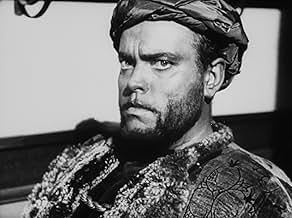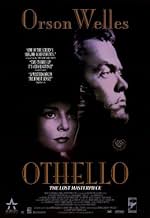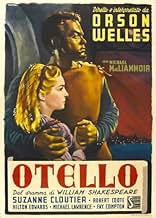La tragedia de Otelo, el moro de Venecia
Título original: The Tragedy of Othello: The Moor of Venice
CALIFICACIÓN DE IMDb
7.5/10
9.7 k
TU CALIFICACIÓN
Un general moro es manipulado para albergar la idea de que su esposa le es infiel.Un general moro es manipulado para albergar la idea de que su esposa le es infiel.Un general moro es manipulado para albergar la idea de que su esposa le es infiel.
- Premios
- 1 premio ganado y 1 nominación en total
Abdullah Ben Mohamet
- Pageboy
- (sin créditos)
Joseph Cotten
- Senator
- (sin créditos)
Jean Davis
- Montano
- (sin créditos)
Joan Fontaine
- Page
- (sin créditos)
Robert Rietty
- Lodovico
- (voz)
- (sin créditos)
Gudrun Ure
- Desdemona
- (voz)
- (sin créditos)
Argumento
¿Sabías que…?
- TriviaThe movie was shot over three years and production was stopped twice, mainly because Welles ran out of money. He then starred in the films "El tercer hombre (1949)" and "El príncipe de los zorros (1949)." He took his payment from those films and used them as money for "Othello".
- Versiones alternativasThis film by Orson Welles, was 'restored' by a group in Chicago in 1991/2. The film was transferred to, and enhanced in video, (D1 format) retaining it as black and white. The audio was completely rebuilt, including the score, in Stereo Surround. All dialogue, however was original. This was a problem as some of the dialogue was distorted and unintelligible. John Fogelson, editor, was a major supervisor of the project. Ed Golya, Lorita DeLacerna, and Steve Wilke, were digital editors. And Ed Golya remixed the soundtrack. The process took 9 months. It was purchased for distribution by Castle Hill, and taken to New York where it went through another transformation before release. The restoration engineer in New York, Paul Michael, restored the audio that was supplied on 35mm optical negatives. He was able to remove the distortion, optical pops and surface noise that is inherent with Optical negatives. The restored audio was then sent to Sound One for the final mix. Unintelligible dialogue was replaced with 'sound-alikes'. This decision was made for the entertainment value of the film. The original mono music was then reintroduced into the final product. Basically, the film was retransferred, and the rebuilt sound effects tracks were added. This was done at Sound One, in NYC.. The credits were adjusted to place Lee Dickter (sp?) as Re-recording Mixer, and Ed Golya as Sound Effects Editor.
- ConexionesEdited into Histoire(s) du cinéma: La monnaie de l'absolu (1999)
Opinión destacada
Right from the start, Othello has a striking visual style. Oblique camera angles (from low and high, close and far), nice use of shadows, a cool-looking castle. Really nice black-and-white imagery to look at.
On the other hand, I wasn't as convinced by the story and acting (but they grew on me as the film continued). There are many parts where actors seem to rush or mumble their lines. Shakespeare is hard enough to follow and a good performance should draw you in and make the dialogue *easier* to understand. Characters are often facing away so we hear their lines but can't see their mouths or their facial expressions. What's the point of acting then? I can act if acting means reciting lines from a Shakespearean play.
I have since learned that Welles was struggling with funds for the movie and that explains some of its short-comings. Especially with sound. He had to dub some of the lines himself and there remain parts which are clearly out of sync. It's hilarious to learn that he borrowed/took costumes from another movie to use on Othello. And that costumes weren't ready for one scene so he changed the location to a bathhouse with the actors in towels.
I find the story flawed. Iago is single-handedly able to manipulate Othello to his will. Iago is unlikable because of his misanthropy but Othello may be even more unlikable in his stupidity. He never thinks to properly analyse or question what Iago presents to him as the truth. He barely seems to communicate with his wife at all and becomes consumed by his obsessions and assumptions. But I do somewhat admire Iago's patience and intelligence, he makes a good villain. And there is real tragedy to what happens. It's conceivable that some unfortunate coincidences could help a seed of suspicion grow into the full-hearted conviction that you're being lied to. And to desire revenge is all too human. It's just funny that nobody suspects Iago. Othello would prefer to believe that everyone else is against him.
I found the ending climactic and meaningful. Some of it took me by surprise, other parts felt inevitable. I'm aware that Welles shortened the play a lot and may have taken liberties with it. At least I now have a rough idea of what Othello is about; I feel more educated. I liked all of the actors but Micheál MacLiammóir (a Dublin actor in his only feature film role) stands out as the antagonist. There's something about his eyes and calm indifference. Less is more.
Summarising, Othello is rewarding for its villain, its believable tragic turn of events and the enjoyable, creative cinematography. Now if only Othello could learn the scientific method...
On the other hand, I wasn't as convinced by the story and acting (but they grew on me as the film continued). There are many parts where actors seem to rush or mumble their lines. Shakespeare is hard enough to follow and a good performance should draw you in and make the dialogue *easier* to understand. Characters are often facing away so we hear their lines but can't see their mouths or their facial expressions. What's the point of acting then? I can act if acting means reciting lines from a Shakespearean play.
I have since learned that Welles was struggling with funds for the movie and that explains some of its short-comings. Especially with sound. He had to dub some of the lines himself and there remain parts which are clearly out of sync. It's hilarious to learn that he borrowed/took costumes from another movie to use on Othello. And that costumes weren't ready for one scene so he changed the location to a bathhouse with the actors in towels.
I find the story flawed. Iago is single-handedly able to manipulate Othello to his will. Iago is unlikable because of his misanthropy but Othello may be even more unlikable in his stupidity. He never thinks to properly analyse or question what Iago presents to him as the truth. He barely seems to communicate with his wife at all and becomes consumed by his obsessions and assumptions. But I do somewhat admire Iago's patience and intelligence, he makes a good villain. And there is real tragedy to what happens. It's conceivable that some unfortunate coincidences could help a seed of suspicion grow into the full-hearted conviction that you're being lied to. And to desire revenge is all too human. It's just funny that nobody suspects Iago. Othello would prefer to believe that everyone else is against him.
I found the ending climactic and meaningful. Some of it took me by surprise, other parts felt inevitable. I'm aware that Welles shortened the play a lot and may have taken liberties with it. At least I now have a rough idea of what Othello is about; I feel more educated. I liked all of the actors but Micheál MacLiammóir (a Dublin actor in his only feature film role) stands out as the antagonist. There's something about his eyes and calm indifference. Less is more.
Summarising, Othello is rewarding for its villain, its believable tragic turn of events and the enjoyable, creative cinematography. Now if only Othello could learn the scientific method...
- Christopher_Reid
- 15 feb 2016
- Enlace permanente
Selecciones populares
Inicia sesión para calificar y agrega a la lista de videos para obtener recomendaciones personalizadas
- How long is Othello?Con tecnología de Alexa
Detalles
- Fecha de lanzamiento
- Países de origen
- Sitios oficiales
- Idiomas
- También se conoce como
- Othello
- Locaciones de filmación
- Castle, El Jadida, Morocco(cistern interior)
- Productoras
- Ver más créditos de la compañía en IMDbPro
Taquilla
- Total en EE. UU. y Canadá
- USD 28,980
- Fin de semana de estreno en EE. UU. y Canadá
- USD 6,010
- 27 abr 2014
- Total a nivel mundial
- USD 28,980
- Tiempo de ejecución1 hora 30 minutos
- Color
- Relación de aspecto
- 1.37 : 1
Contribuir a esta página
Sugiere una edición o agrega el contenido que falta

Principales brechas de datos
By what name was La tragedia de Otelo, el moro de Venecia (1951) officially released in India in English?
Responda

































